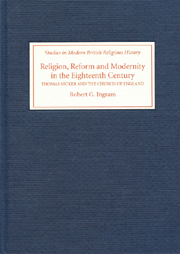Book contents
- Frontmatter
- Contents
- Dedication
- Preface
- Abbreviations
- 1 ‘Efforts at Amendment’
- 2 Becoming an Anglican
- 3 Becoming an Insider
- 4 The Church and the Enlightenment
- 5 The Church and the Parishioners
- 6 The Church and the State
- 7 The Church and America
- 8 The Church and Churches Abroad
- Epilogue
- Bibliography
- Index
- Previously published volumes in this series
6 - The Church and the State
Published online by Cambridge University Press: 12 September 2012
- Frontmatter
- Contents
- Dedication
- Preface
- Abbreviations
- 1 ‘Efforts at Amendment’
- 2 Becoming an Anglican
- 3 Becoming an Insider
- 4 The Church and the Enlightenment
- 5 The Church and the Parishioners
- 6 The Church and the State
- 7 The Church and America
- 8 The Church and Churches Abroad
- Epilogue
- Bibliography
- Index
- Previously published volumes in this series
Summary
Convocation embarrassed many among the orthodox during the eighteenth century. It was the nation's spiritual parliament, in its highest conception the spiritual co-equal to the Parliament at Westminster. In the first decades of the century, though, controversy spilled out from the Houses of Convocation, further fuelling the nation's already combustible political life. The crown subsequently interpreted the royal supremacy to include the power to stop Convocation from conducting substantive business. From 1717 until the mid nineteenth century, the gathering of the clergy in Convocation was purely ceremonial, an act that for many highlighted the Church's emasculation.
The antiquarian-cleric William Stukeley was one of those frustrated with Convocation's crippled state, and in the spring of 1754 he wrote to Archbishop Herring with complaints. ‘It is a great grief of mind, whenever I think of that ill-fated day that the convocation gave up their right of granting money to the crown,’ because it robbed the Church of England's clergy of political influence. ‘Before then, the clergy were on a good footing, had some real worth in the eye of the government,’ Stukeley argued. Now, however, they ‘are a body suspended merely on the cobweb thread of a minister's favour and ready to be given up to the commons whenever an exigency of affairs affords a colour to it, and there is a pretended want of their church estates’. The opening of the ‘floodgate of dissenters’; the ‘neglect and desecration of the Sabbath’; ‘popery, with its subtleties, triumphant’; and ‘the infidelity daily spreading among us, chiefly from the impunity in printing wicked, blasphemous, anti-Christian, atheistic books’ predictably followed from Convocation's inactivity.
- Type
- Chapter
- Information
- Religion, Reform and Modernity in the Eighteenth CenturyThomas Secker and the Church of England, pp. 157 - 208Publisher: Boydell & BrewerPrint publication year: 2007



